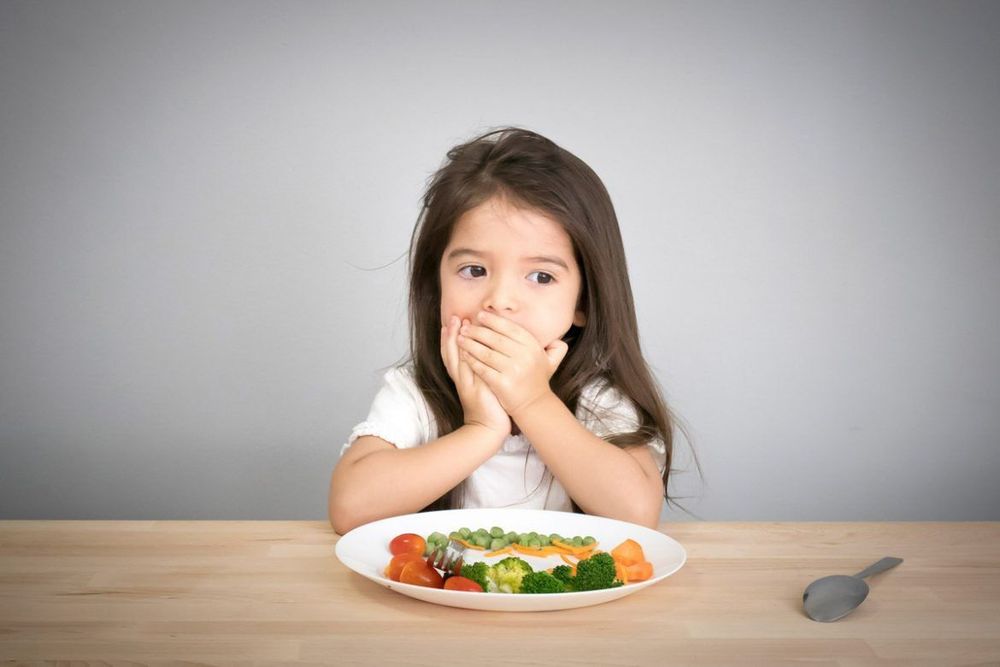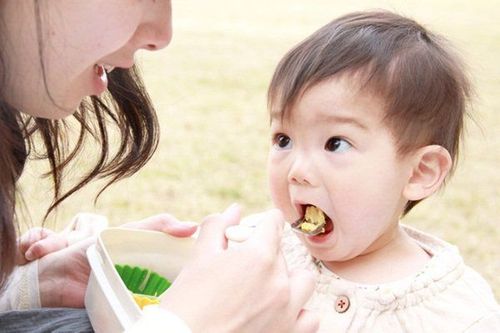This is an automatically translated article.
Anorexia children will cause malabsorption, malnutrition or worse, a weakened immune system, making parents worried. What should the mother do when the child is anorexic? Let's find solutions to help your baby eat well again in the article below!1. Causes of anorexia in children
1.1. The menu is boring
Thực đơn nhàm chán sẽ khiến bé trở nên lười ăn hơn
1.2. Baby is not feeling well One of the other common reasons why a baby is more lazy to eat than usual is because he is sick. Adults, when they have colds and mild fevers, don't eat well, let alone children. Therefore, parents should pay attention to their baby's daily manifestations more often, if the baby shows signs of cough, runny nose, low fever, etc., take the child to see a doctor to avoid this case. disease with more dangerous complications
1.3. Food that does not suit your baby's taste Your favorite food is not necessarily what your baby wants to eat. Even though you know that you will make a scientific standard nutritional menu so that your baby can eat enough nutrients, he will not be able to realize that. When it doesn't suit your baby's taste, your baby will not eat, and you force him to eat, inadvertently that will make him pressured at every meal, leading to anorexia children being stunted and afraid of eating.
1.4. The snack is so full that the baby does not want to eat the main meal When the baby eats too much snacks at the snack time, it will lead to fullness in the main meal and the child will skip meals. Snacks often have many potential health hazards, for example, popular snacks that children like are candies, snacks, chips... These foods are high in artificial sweeteners, many grease and starch, will harm the baby's body and mind. Eating too much will cause tooth decay, digestive disorders, constipation, obesity, osteoporosis and cardiovascular problems.
1.5. Children are deficient in vitamins and minerals Deficiency of minerals such as zinc, selenium will make the baby feel unappetizing and lazy to eat. If necessary nutrients are not provided in a timely manner, children with anorexia for a long time will cause malnutrition, stunting, and mental retardation.
1.6. Due to change in living environment Around the time when children start going to school, the living environment changes rapidly, making them unable to adapt, leading to a state of fear, psychological stress, and they will not feel like eating. This long-term situation will cause many effects on the child's psychological, health as well as physical development. 1.7. Children are too active Because the baby is too eager to play, leading to refusal to eat is the most common cause in children with anorexia. The distraction in eating because of the surrounding influences will gradually become a habit, causing lazy eating in children.
2. How to overcome the child's anorexia

Cứ để cho bé thoải mái ăn theo sở thích
You should cut down on the number of meals for your baby. A 3-year-old really doesn't need 5 meals a day. Between breakfast and lunch, instead of giving your baby porridge or a back of rice, give him a banana or a piece of papaya, so that he will have a more delicious lunch later.
Absolutely abstain from reducing baby's snacks. You should observe to see if your baby often eats snacks? A few candies, a packet of snacks, seem like nothing but greatly affect the child's appetite.
Reduce the child's food intake when the child is anorexic. A full bowl of rice won't stimulate your baby's appetite at all. It's the other way around - this makes children scared and bored. It will be completely different if in front of the baby is a small piece of meat, a little rice and a few tablespoons. A portion just enough will make your baby more interested in eating than having to "fight" with a bowl full of rice.
Make a weekly nutritional menu for your child that is diverse and attractive. If you serve your baby a dish of braised meat with eggs every day, it's not surprising that he doesn't want to eat it. If the next meal, you give your baby a piece of fried fish or a bowl of rib soup stewed with potatoes and radish, you will find that at least your baby is more enthusiastic about eating!
Try to decorate your baby's food with cute and delicious colors. Next to the white cauliflower buds are bright orange carrot petals, next to the green cowpeas have red tomatoes... A very good idea is the mixed salad: Carrots, sweet peppers, bean sprouts. , potatoes, cucumbers...
Let your child choose their own menu. Before cooking, ask your child: "What do you like to eat?" and offer a menu that you can make for your child to choose from. Maybe she won't choose at all, you know what! But maybe your baby will like something.
Indulge in some of your baby's erratic interests. If your child insists on drinking tomato and orange smoothies, don't take that as an annoyance, just do as he pleases. That is just a taste. If your baby just likes triangle sandwiches or drinks milk from a straw, just follow his whim, he will surely get bored at some point.
Don't force your child to eat something he or she doesn't like. Instead of forcing children to eat meat, you can give them eggs, fish or sausages. If your child is afraid of vegetables, instead of getting frustrated, give him more fruit or juice to add fiber.
You can use the "old wine new bottle" tactic by instead of feeding your baby meat with rice, for example, make an American burger. You can put the soup in a cup as a drink instead of the usual bowl. You try to grind the fruit and then put it in the freezer to freeze. Small variations are strange that will make your baby more interested in eating.
Only children drink water after eating, not letting them eat and drink at the same time, especially before meals. If before the meal, the baby's tiny stomach has been filled with fresh water, then of course the lunch meal no longer has the right to reside in it.
You do not feed the baby, let the baby feed himself. Most 2- and 3-year-olds will eat more if their mothers let them eat on their own. If the mother keeps fertilizing because she is afraid that the child will not eat, gradually the baby realizes that eating right is an unpleasant thing, just like washing hair or taking medicine, because it is also the mother that does it for the baby. Let your baby see that eating is fun, like playing a game.
Let your baby eat together during family meals. Eating alone is so boring. If dad tells a story about a bird that came to make a nest in the garden, mom tells a funny story when going to the market... So the baby eats while enjoying listening to the story and shoveling all the rice bowls is not good!
You should know that "no" is a necessary answer. Never force your baby to eat the last spoonful of rice. If your baby says she's full, let her put the bowl down, and don't force her to finish the bowl. Pay attention to the atmosphere of the meal. The rush, confusion, daily conflicts between parents will make the baby lose his appetite.
Let your baby join you in the cooking. Children will find that the water spinach that they pick by their own hands, or the meat that they mix with their own hands, will taste much better.
Your baby doesn't have to eat all the servings at once. Try dividing your child's portion sizes, for example, he can have a mid-morning meal after a walk, or a small bowl of porridge before he goes out to play with friends. Maybe the fresh air will make the stir-fry beef that your baby hates more delicious.
The above are suggestions to help each meal not be a battle with an anorexic child.
If the child's anorexia persists for a long time, parents should supplement children with supportive products containing lysine, essential micro-minerals and vitamins such as zinc, chromium, selenium, and B vitamins to help fully meet their needs. nutritional requirements in children. At the same time, these essential vitamins also support digestion, enhance nutrient absorption, help improve anorexia, and help children eat well. Parents can also apply dietary supplements and functional foods of natural origin for easy absorption by the baby. The most important thing is that the improvement of the baby's symptoms must take place over the long term. Combining many types of functional foods at the same time or changing many types in a short time can make the baby's digestive system unable to adapt and completely not good. Therefore, parents must be really persistent with their children and regularly visit the website vimec.com to update useful baby care information.













